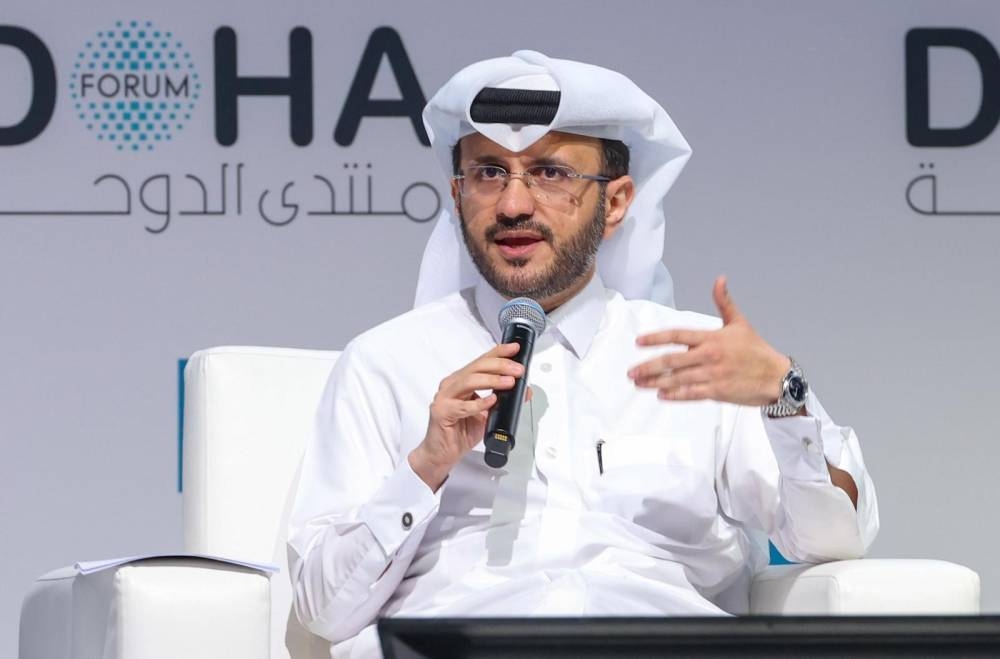Advisor to the Prime Minister and Official Spokesperson for the Ministry of Foreign Affairs, Dr. Majed bin Mohammed Al Ansari said that the ceasefire in the Gaza Strip needs political will, especially since the formula of the agreement between the two parties was acceptable, but there was political exploitation of this matter, so Qatar decided to stop its role as a mediator because it did not want to be used as a tool in this conflict.
In a discussion panel entitled "The Future of US Strategy in the Middle East Following the 2024 Election," held as part of the second and final day of the Doha Forum 2024, Al Ansari voiced the State of Qatar's optimism about the next stage, especially since US President-elect Donald Trump seeks to find solutions to the region's problems. He noted that this is a promising matter and pressure must be exerted on all parties to end this conflict and rebuild the region.
During the discussion panel that was moderated by Director of the Scowcroft Middle East Security Initiative at the Atlantic Council's Middle East Program Jonathan Panikoff and attended by HE Former White House Middle East Envoy during Trump's first administration and Founder of Abraham Ventures Limited Jason Greenblatt, Founder and Chairman of the Gulf Research Center Dr. Abdulaziz Sager, and Director of the Middle East and North Africa Program at Chatham House Dr. Sanam Vakil, Al Ansari said that the State of Qatar looks forward to continuing to work with the administration of US President-elect Donald Trump, especially since both countries have a long record of cooperation in various areas in the past, which Qatar hopes to continue in the future.
He voiced his hope to enhance positive dialogues and constructive discussions between the United States and the region's countries, and not to marginalize these countries as happened with some regions in the world.
The Advisor to the Prime Minister and Official Spokesperson for the Ministry of Foreign Affairs indicated that during the Arab Spring, Qatar dealt with the administration of President Barack Obama at the time, and continued to work with the administration of President Donald Trump on many files. Qatari cooperation with the administration of President Joe Biden also continued, especially with regard to the current conditions in the occupied Palestinian territories in several areas, particularly the issue of mediation for a ceasefire.
He pointed out the importance of enhancing dialogue between the countries of the region, focusing on the interests of all, and transcending the specific or subsidiary interests of each country, to achieve global peace and prosperity. In this context, he noted that if any problem occurs in Washington, the Middle East will be affected by it.
He stressed that the continuation of wars affects the future generations, adding trust in governments and the international community is already diminishing when talking about the killing of 50,000 people in the Gaza Strip to date in view of the state of paralysis experienced by the international community which stands helpless in dealing with this matter until now.
It may be impossible to reach an agreement on all the details of how to deal with the Palestinian issue or any other issue, but we must all agree to stop the bloodshed immediately, he said.
Al Ansari continued by saying that they must all deal with all parties and put pressure on them before starting to discuss any future because pressure on both sides is essential and necessary in any type of mediation, especially since it takes place between conflicting parties and not friendly ones.
He reiterated that the State of Qatar exerted all its efforts and capabilities in this regard, but its capabilities as a mediating party remain limited. When Qatar wanted to use its capabilities, it froze its mediation until the circumstances are favorable for that. It also confirmed that it is re-evaluating its role and using all its capabilities in this context without pressuring one party at the expense of the other.
Participants in the discussion session expressed deep appreciation for Qatar's efforts in mediation, conflict resolution and dispute resolution in the region and the world along with its important role in returning hostages and prisoners to their homelands.
During the session, they touched on the escalation of events in the Middle East, especially the situation in the Arab region, calling on the United States of America to exert pressure to establish peace and restore security and stability in the region.
They pointed out that the devastation caused by the war between Israel and Hamas in the Gaza Strip, and the resulting humanitarian crisis, are originally due to the continued increasing tensions that the region has been witnessing for a long time, expressing their concerns about the influence of non-state actors on the region by challenging the approach of President Trump’s administration in dealing with regional crises in the region as a whole.
They called on the United States of America to adopt clearer goals for its future policies in the Middle East region and to work on strengthening relations and alliances between the countries of the region; with the aim of launching a new, more peaceful phase, and in a way that contributes to confronting the increasing challenges facing the world today.
They further said that the countries of the region do not want wars to break out, given the multiple consequences that would result from that which would make matters more complicated. They also noted the importance of working to promote understandings and enhance constructive dialogue between the various parties to realize the interests of all in security and stability.

